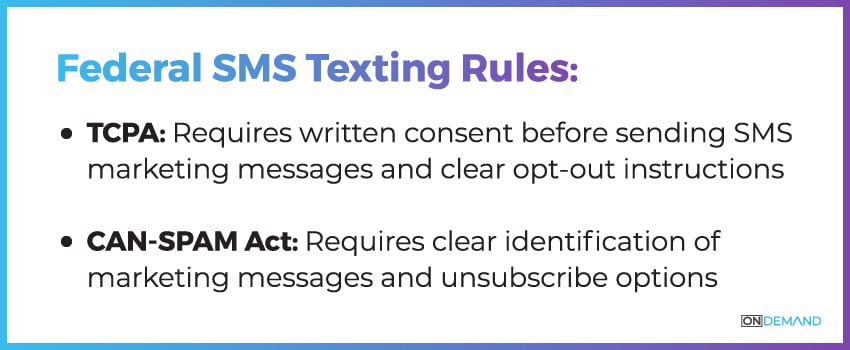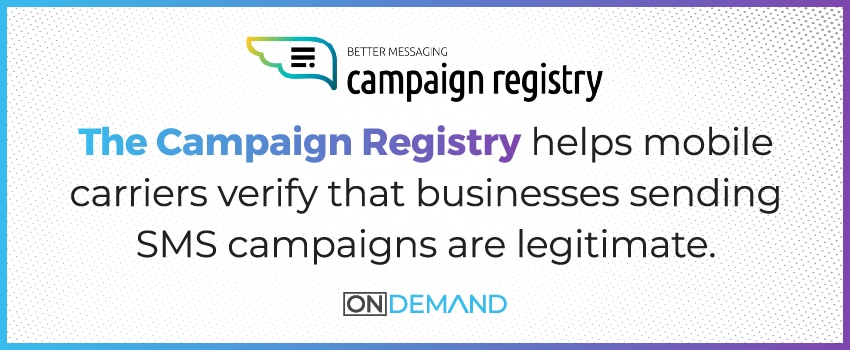A whopping 79% of consumers opted in to receive texts from businesses in 2024,1 so it’s no wonder that more businesses are turning to SMS marketing to improve customer engagement and communication. But when it comes to SMS texting in the United States, organizations must follow strict regulations to protect themselves and their consumers.
Text messaging laws govern how companies can communicate with customers via SMS, including rules on consent, content, and message frequency. In this blog, we’ll break down the essential regulations for complying with SMS texting rules in the USA.
Federal SMS Texting Rules
At the federal level, SMS texting is primarily regulated by the Telephone Consumer Protection Act (TCPA) and the CAN-SPAM Act. Here’s an overview of these laws:
- TCPA: The TCPA requires express written consent before sending marketing messages via SMS. Recipients must actively opt-in to receive text messages, and businesses must include clear opt-out instructions in their communications.
- CAN-SPAM Act: Though originally created for emails, the CAN-SPAM Act also applies to SMS marketing. It mandates that marketing messages are clearly identified as advertisements and that recipients can unsubscribe at any time.
These federal laws are designed to protect consumers from unsolicited and unwanted text messages, and violating them can result in hefty fines.

State-Specific Texting Rules
In addition to federal regulations, many states have specific laws that further regulate SMS marketing. These laws vary across states, and businesses must comply with the rules in each state where they operate.
Some states may impose additional restrictions, such as limitations on when messages can be sent. For example, Florida, Washington, Oklahoma, Mississippi, and Maryland prohibit marketing messages from being sent between 8 p.m. and 8 a.m. local time. Make sure to review state-specific SMS regulations for each state you do business in, as non-compliance can lead to fines and legal action.
What Is The Campaign Registry?
In an effort to improve trust in SMS marketing, many carriers now require businesses to register their SMS campaigns through The Campaign Registry (TCR). TCR helps mobile carriers verify that businesses sending SMS campaigns are legitimate by requiring information about the campaign, such as message types, the purpose of the campaign, and the intended audience.

Proper registration provides benefits like:
- Improved Delivery: Registration improves message delivery rates across all major carriers, so marketing messages reach intended audiences more consistently.
- Spam Prevention: Registered campaigns receive priority treatment from carriers, resulting in fewer messages getting flagged as spam.
- Carrier Trust: Registration establishes a verified relationship with mobile carriers, which can lead to faster message processing and improved throughput rates.
- Regulatory Compliance: The Campaign Registry helps businesses comply with industry regulations by documenting campaign details and maintaining transparent communication records.
In a nutshell, TCR provides essential verification and monitoring services that protect both businesses and consumers – while maximizing SMS marketing effectiveness.
Ready To Navigate SMS Texting Rules With Confidence?
SMS is a powerful communication channel for businesses, but complying with texting rules is vital. At OnDemand, we partner with trusted providers to help you implement effective, compliant SMS marketing strategies that align with your business goals. Whether you’re looking to launch a new SMS campaign or optimize an existing one, we’re here to provide the guidance you need.
Contact us today for expert help navigating SMS texting rules in the USA.
Sources:
